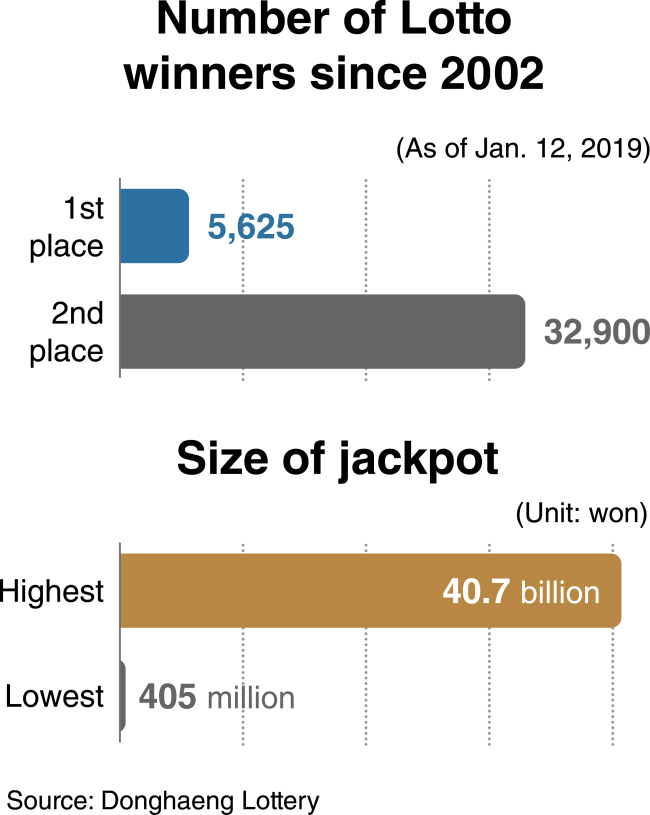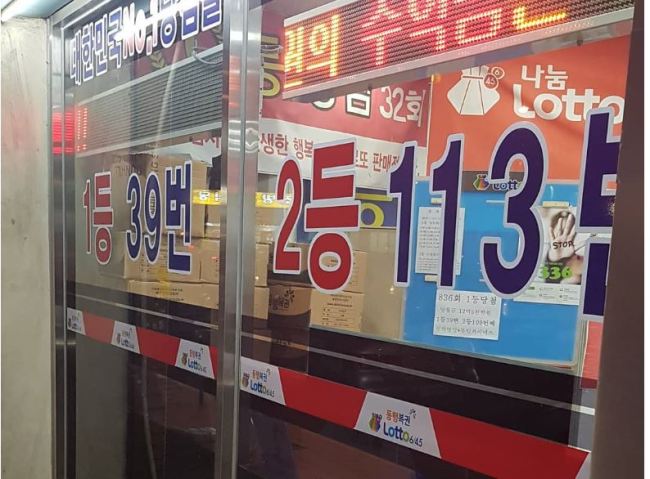[News Focus] 16-years on, Lotto still generates disputes, complaints
By Kim Yon-sePublished : Jan. 14, 2019 - 16:16
SEJONG -- South Korea’s biggest lottery “Lotto 6/45” has entered its 17th year, with more than 5,600 citizens netting the weekly jackpot since 2002.
The jackpots ranged from 40.7 billion won ($36.4 million) to 405 million won – before tax of 22 percent for winnings up to 300 million won and 33 percent for any additional winnings above that. The average pre-tax prize over the past 16 years was 2.02 billion won per winner.
The jackpots ranged from 40.7 billion won ($36.4 million) to 405 million won – before tax of 22 percent for winnings up to 300 million won and 33 percent for any additional winnings above that. The average pre-tax prize over the past 16 years was 2.02 billion won per winner.

The Finance Ministry allowed the Internet sales of Lotto tickets within the ceiling of 5,000-won purchase a week per individual in early December 2018, when the Lotto business operator and drawing broadcaster changed from Nanum and SBS to Donghaeng and MBC.
For the offline sales, the government is considering withdrawing contracts with convenience stores such as CU and GS25 as part of its policy to give the sales authority to lottery ticket-only businesses.
While the Finance Ministry is reportedly in consultation with Donghaeng to select new sales retailers, the move has faced a backlash from convenience store-owners, particularly those who are self-employed.
Operator Donghaeng and the retailers share the earnings from the Lotto sales with the markup on the basic 1,000-won ticket at 50 won. The collective profit at the 604 convenience stores with the sales authority comes to 12 billion won a week.
“Lotto buyers purchase other goods like beer and beverages. The policy is expected to deal a blow to our sales,” said a convenience- store owner in Bucheon, Gyeonggi Province. “Policymakers should contemplate the fact that convenience-store owners are burdened with royalty payments to franchise headquarters.”
He added the situation has worsened due to the drastic hike in the statutory minimum wage for part-time workers.
A Finance Ministry official was quoted by a news provider as saying that “the government will recall the sales authority on the basis of minimizing damaga to the self-employed convenience-store owners.” But he reportedly hinted that the detailed road map surrounding the withdrawal process would not be conducted for the long term but for the coming months.
A seller complained, saying, “Amid the sluggish economy, more and more citizens are pinning their hopes on the lottery. It’s inappropriate to take our right to sell tickets at the present stage as the ticket sales have tended to grow inversely when the people’s livelihood is difficult.”
Complaints about the Lotto system have been rampant among people in the online community for the past decade.
“In Korea, there is no jackpot like Mega Millions winners in the US, who take some hundred billion-worth prize,” a netizen said. “Lotto winners generally take home only about 1 billion won after tax. That is far short of enough to buy an apartment in Gangnam.”
The government, citing gambling spirit worries, halved the basic ticket price from 2,000 won to 1,000 won in 2004.

Netizens have called for the broadcaster to show the draw live at 8 p.m. on Saturday, when the weekly sales close, turning from the current recorded-broadcast in order to improve credibility.
Further, complaints about the recent decision to allow Internet sales are also growing, as aside from the quite low purchase ceiling of 5,000 won, the government is still banning mobile phone sales.
A netizen questioned, “What is the difference between desktop or laptop computers and smartphones in using the Internet? Considering that the ministry has been allowing citizens to buy Pension Lottery 520 via smartphones since 2012, it does not make sense in terms of equality.”
A netizen in his 40s complained that the government regulated and interfered all areas of citizens’ lives, such as apartment subscriptions, the year-end tax adjustment for salaried employees, the minimum wage and the lottery.
On the contrary, some say that the Lotto sales authority should be expanded to the underprivileged, not retail chains, following the initial policy when it was introduced.
A netizen claimed, “Many Koreans from young and old generations lose their money heavily not only from lotteries but from Sports Toto. It is lamentable as the situation reflects the difficulty in getting jobs and frustration from the sagging economy.”
By Kim Yon-se (kys@heraldcorp.com)











![[Today’s K-pop] BTS pop-up event to come to Seoul](http://res.heraldm.com/phpwas/restmb_idxmake.php?idx=644&simg=/content/image/2024/04/17/20240417050734_0.jpg&u=)




![[KH Explains] Hyundai's full hybrid edge to pay off amid slow transition to pure EVs](http://res.heraldm.com/phpwas/restmb_idxmake.php?idx=652&simg=/content/image/2024/04/18/20240418050645_0.jpg&u=20240418181020)

![[Today’s K-pop] Zico drops snippet of collaboration with Jennie](http://res.heraldm.com/phpwas/restmb_idxmake.php?idx=642&simg=/content/image/2024/04/18/20240418050702_0.jpg&u=)